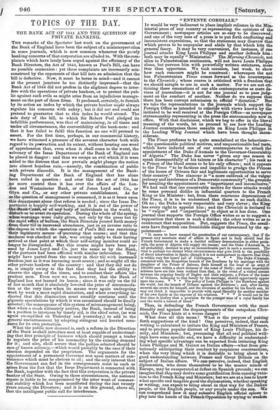TOPICS OF THE DAY.
THE BANK ACT OF 1844 AND THE QUESTION OF PRIVATE BANKING.
THE remarks of the Spectator last week on the government of the Bank of England have been the subject of a misinterpretation
in some journals, which is now common whenever the purely
banking concerns of that corporation are alluded to. With the com- plaints which have lately been urged against the efficiency of the Bank Directors, the Act of 1844, known as Peel's Bill, can have
no possible connexion : yet these complaints are incessantly mis- construed by the opponents of that bill into an admission that the bill is defective. Now, it must be borne in mind—and it cannot
at the present juncture be too distinctly impressed—that the Bank Act of 1844 did not profess in the slightest degree to inter-
fere with the operations of private bankers, or to protect the pub- lic against such evils as might arise from an injudicious manage- ment on the part of those firms. It professed, certainly, to furnish
by its action an index by which the private banker might always
regulate his concerns with safety ; but it did not and could not pretend to guarantee that to this index he would attend. The sole duty of the bill, to which Sir Robert Peel pledged its infallible performance, was that of maintaining, in all times and under all circumstances, the convertibility of the bank-note : and that it has failed to fulfil this function no one will pretend to
assert. For the first time, perhaps, in our commercial history, we have witnessed a pressure of the severest character both with
regard to its protraction and its extent, without hearing one word of apprehension that, even when it shall come to the worst, the solvency of the Issue Department of the Bank of England can
be placed in danger : and thus we escape an evil which if it were added to the distress that now prevails might plunge the nation into almost hopeless ruin,—namely, the combination of public with private discredit. It is the management of the Bank- ing Department of the Bank of England that has alone been called in question : and over this the act of 1844 has no more control than it has over the affairs of the Lon- don and Westminster Bank, or of Jones Loyd and Co., or Glyn and Co., or any other private establishment. As far as the question of management is concerned, it is as it bears upon this departmeat,alone that reform is needed ; since the Issue De- partment is happily self-working, and it is out of the power of Iheillan4r7Coitra, ar of an body of individuals in the world, to disiturh or to. avert its operation. During the whole of the spring, whets 'warnings were daily given, not only by the press but by the rapid efflux d bullion, the Bank Directors poured forth money from their till in increased abundance, just in an inverse ratio to the,degree in which the sifferation of Peel's Bill was restricting their legitimate means of 'pursuing that course; and that this madness was checked at last, was owing solely to their having arrived at that point at which their self-acting monitor could no longer be disregarded. But this course might have been pur- sued by Jones Loyd and Co. just the same as by the Bank, if the partners had been afflicted with similar infatuation. They might have parted from the money in their till with increased freedom just as it was becoming more scarce ; and so might all the other private bankers of the country : and that they did not do so, is simply owing to the fact that they had the ability to observe the signs of the times, and to conduct their affairs like prudent men. Even now we see, however, that the Bank of England has not learned its lesson ; since it was only on the 2d of last month that it absolutely lowered the price of accommoda- tion at the very time when its means were again undergoing week by week a most rapid diminution, and when everything in- dicated that this diminution must steadily continue until the gigantic speculations by which it was occasioned should be finally arrested ; the consequence of this system of mismanagement being, that when a crash ultimately arrives, the Bank, instead of being in a position to interpose by timely aid, is the chief actor, (as was again exemplified on Thursday and yesterday,) to add to the general embarrassment by adopting stringent and hurried mea- sures for its own protection. What the public now demand is, such a reform in the Direction of the Bank as shall introduce men at least capable of understand- ing that first principle of business which should prompt a trader to regulate the price of his commodity by the existing demand for it ; and also, shall secure that the parties selected should be men of known solvency,—which would probably be the case if their election depended on the proprietors. The arguments for the appointment of a permanent Governor rest upon matters of con-
venience which must be obvious to all ; and the only interest that the Government can feel in the arrangements must be such as arises from the fact that the Issue Department is connected with the Bank, together with the fact that this corporation is the private banker of the State. Owing to these circumstances, the national repute is liable to be compromised by the utter want of commer- cial stability which has been manifested during the last twenty years among the Directors; and it is on this ground, above all, that the intelligent public call for interference.


























 Previous page
Previous page